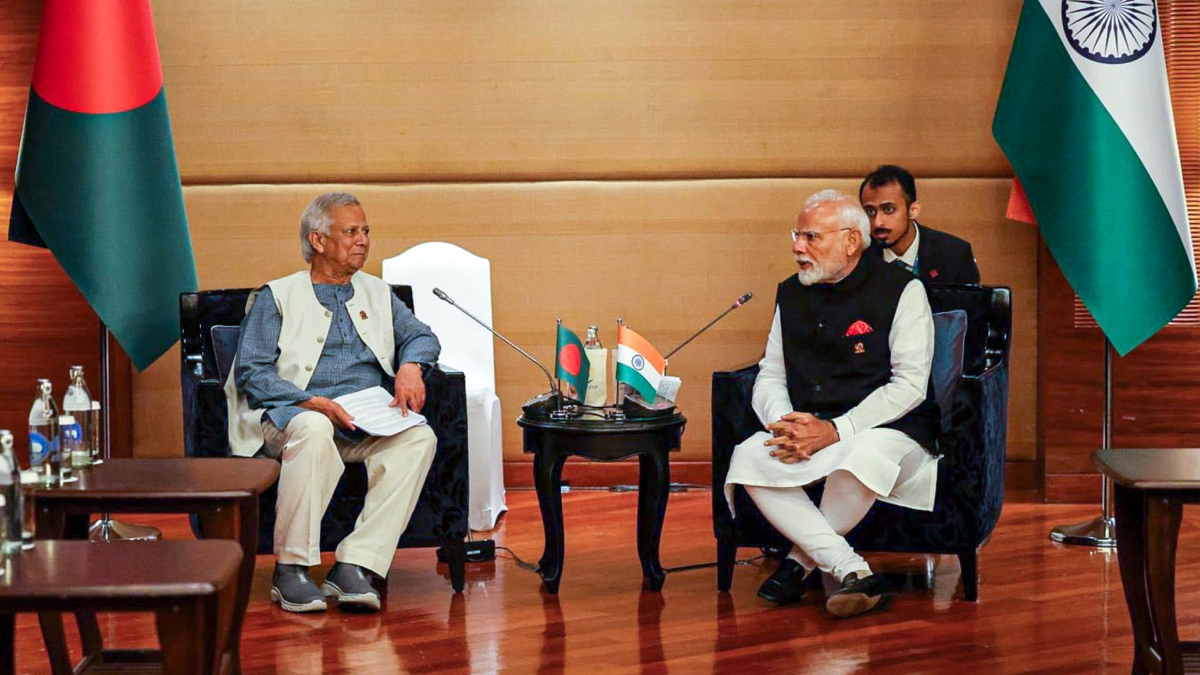Why India should be wary of strategic drift in Bangladesh’s power corridors in favour of Pakistan, China
 Prime Minister Narendra Modi during a meeting with the Chief Adviser of Bangladesh Professor Muhammad Yunus on the sidelines of the 6th BIMSTEC Summit in Bangkok | PTI
Prime Minister Narendra Modi during a meeting with the Chief Adviser of Bangladesh Professor Muhammad Yunus on the sidelines of the 6th BIMSTEC Summit in Bangkok | PTI
Last week’s trilateral dialogue between China, Pakistan, and Bangladesh in Kunming, Yunnan, emerged as a symbolic inflection point—signalling subtle shifts in the region’s strategic alignments. The meeting, which brought together Chinese Vice Foreign Minister Sun Weidong, Bangladesh’s Acting Foreign Secretary Ruhul Alam Siddique, and Pakistan’s Additional Foreign Secretary Imran Ahmed Siddiqui, highlighted Beijing’s ambitions to recalibrate South Asia’s geopolitical architecture and hinted at its growing efforts to draw Dhaka closer into its expanding sphere of influence.
Interestingly, Bangladesh’s response was marked by restraint. It notably withheld full endorsement of the proposed Joint Working Group (JWG), which was intended to operationalise a broader trilateral agenda. Citing the need for further high-level consultations, Dhaka expressed reservations about the wide-ranging scope of the initiative—reflecting a measured caution rather than outright opposition.
Amid the backdrop of increasingly strained ties between India and Bangladesh over the past year—exacerbated by the political transition in Dhaka—there has been mounting media speculation that the trilateral meeting was a calculated move to diplomatically sideline India. On June 26, Foreign Affairs Adviser Md Touhid Hossain clarified Bangladesh’s position, categorically ruling out the formation of any new alliance with China and Pakistan. Emphasizing the informal and non-political nature of the engagement, he stated, “We are not forming any alliance. It was a meeting at the official level, not at the political level… There was no element of formation of any alliance.” He also underscored that the meeting was not intended to target any neighbouring country, implicitly allaying concerns in New Delhi.
Dhaka’s restraint reflects a delicate balancing act—one that seeks to explore emerging partnerships while avoiding a premature rupture with New Delhi, its long-standing strategic ally.
For India, nevertheless, the broader signals are increasingly disquieting. This trilateral engagement occurs at a time when Dhaka’s strategic divergence from New Delhi is becoming increasingly apparent. Despite resisting formal institutionalisation through the JWG, Bangladesh, China, and Pakistan collectively agreed to deepen cooperation across a sweeping array of sectors, from trade and investment to the digital economy, maritime affairs, education, and public health.
Chief Advisor Muhammad Yunus’ renewed advocacy for the South Asian Association for Regional Cooperation (SAARC) adds a revealing dimension to Bangladesh’s ongoing strategic recalibration. With India having long withdrawn from SAARC over Pakistan’s continued support for cross-border terrorism, and has shifted its focus to the more pragmatic and cooperative BIMSTEC, Dhaka’s push to resuscitate the defunct regional bloc raises deeper questions.
At a time when BIMSTEC is gaining institutional traction, Yunus’ emphasis on SAARC points to a deliberate reorientation of foreign policy—one that seeks to court stakeholders less aligned with New Delhi, signalling a subtle yet significant divergence from the strategic path charted by its predecessors.
From recalibrated foreign policy overtures, evolving defence priorities, and the interim government's controversial appointments to its widening crackdown on dissent, the patterns point to a Bangladesh amid strategic assertion.
A striking development in this trajectory is the potential appointment of Lt Gen (retd) Abu Tayub Md Zahirul Alam as Bangladesh’s Deputy National Security Adviser, a move widely seen as emblematic of the Yunus-led interim government’s evolving ideological tilt. Zahirul Alam, a polarizing figure with well-documented links to Pakistan’s ISI and a record of promoting anti-India sentiment, represents more than just a personnel choice: he embodies a broader strategic departure from Bangladesh’s traditionally secular, India-aligned orientation.
During his tenure as Commandant of the National Defence College, Zahirul Alam courted controversy by reportedly granting access to Pakistani military officers, a decision that raised concerns about his proximity to Islamabad’s strategic establishment. His nomination also casts into sharp relief the growing ideological chasm between Zahirul Alam and Bangladesh Army Chief General Waker-Uz-Zaman who has championed timely elections, civilian oversight, and the apolitical character of the armed forces. Their contrasting visions reflect a deeper struggle over the country’s strategic future and suggest a conscious shift away from the pluralist, India-friendly legacy of the Awami League (AL) era.
Compounding Bangladesh’s evolving strategic recalibration is a deepening internal crackdown that has further destabilized the domestic political landscape. The Yunus-led government’s ban on all activities of the AL, the country’s oldest and most historically significant political party under the Anti-Terrorism Act has drawn sharp criticism. The UN High Commissioner for Human Rights condemned the ban as a violation of fundamental freedoms.
The recent arrest of Sabina Akter Tuhin, a former AL Member of Parliament, alongside the detention of independent MP Mohammad Faisal Biplob, tied to the political unrest of the previous year, suggest a systematic purge of dissenting voices under the interim regime.
Against the backdrop of an increasingly volatile domestic landscape, defined by hardline appointments, a crackdown on political dissent, and the deferral of elections Dhaka’s current reticence to endorse a new alliance among Bangladesh, China, and Pakistan projects diplomatic caution. Yet beneath this veneer of restraint, an unmistakable recalibration of Bangladesh’s geopolitical bearings now confronts us with growing clarity.
(The author is an analyst on strategic and geoeconomic affairs)
World